SPECIAL EXPO EDITION
Methane to Markets Partnership Expo a Great Success!
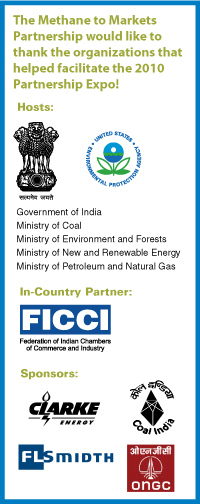
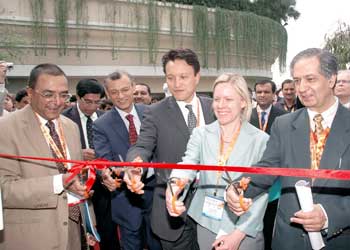 From
March 2 to 5 2010, the Methane to Markets Partnership welcomed more than 500 project
developers, financiers, policymakers, manufacturers, and government representatives
to New Delhi, India. Attendees, representing 36 countries, met to promote methane
recovery and use project opportunities and technologies.
From
March 2 to 5 2010, the Methane to Markets Partnership welcomed more than 500 project
developers, financiers, policymakers, manufacturers, and government representatives
to New Delhi, India. Attendees, representing 36 countries, met to promote methane
recovery and use project opportunities and technologies.
YK Modi, past President of the Federation of Indian Chambers of Commerce and Industry (FICCI), gave opening remarks and welcomed attendees to the four-day event. Blair Hall, Minister Counselor for the U.S. Embassy in India, provided a brief overview of global climate change issues, followed by Dina Kruger, Acting Chair of the Steering Committee and the Director of the U.S. Environmental Protection Agency's (U.S. EPA's) Climate Change Division, who gave a State of the Partnership presentation (PDF, 19 pp, 472 KB).
The Expo's agenda (PDF, 23 pp, 144 KB) featured high-level plenary sessions, technical and policy breakout sessions, subcommittee meetings, and methane project site tours. In addition, each day began with a cross-cutting roundtable. The first roundtable focused on national methane policies, the second on financing mechanisms to support international methane project development, and the third on gas end-use technologies. The closing plenary session included concluding remarks from technical and policy sessions as well as a summary of Steering Committee decisions (PDF, 32 pp, 575 KB) from Dina Kruger.
New Directions for the Partnership
The Methane to Markets Steering Committee met on three consecutive days to revise the Partnership's current policies and make recommendations for future actions. Partners presented country statements and updates and subcommittee chairs reported on their progress. In addition, the Steering Committee:
- Welcome Ethiopia and Ghana


The Steering Committee approved both Ethiopia and Ghana's requests to join the Partnership and sit on the Steering Committee. Ethiopia and Ghana will join 31 other Partners and increase Methane to Markets' representation from Africa. Ethiopia is looking at opportunities for methane capture and use projects in the sectors of manure management and landfill management and will be joining the Agriculture and Landfill Subcommittees. Ghana is interested in landfill and oil and gas projects and will be joining the respective subcommittees. Officially approved Ethiopia and Ghana's application to join the Partnership (see side bar).
- Drafted a revised Terms of
Reference (TOR) (PDF, 43 pp, 1.3 MB). The proposed changes include expanding
the Partnership's scope to include methane abatement, encouraging review of subcommittee
leadership every three years, and asking Partners to complete and implement action
plans, as well as periodically communicate their progress and accomplishments to
the Administrative Support Group (ASG).
The Steering Committee also added language to the TOR creating linkages between
the Partnership and the United Nations Framework
Convention on Climate Change (UNFCCC)
 .
As next steps, the ASG will circulate a revised version of the TOR to all Steering
Committee members for a 60-day review. The final draft will be made available to
all Partners in advance of the proposed Ministerial meeting (see below).
.
As next steps, the ASG will circulate a revised version of the TOR to all Steering
Committee members for a 60-day review. The final draft will be made available to
all Partners in advance of the proposed Ministerial meeting (see below).
- Planned a Ministerial-level event to be hosted by Mexico in conjunction with the
UNFCCC Conference of Parties
 in late 2010. This event will mark the initiation of the revised TOR and include
a Ministerial Declaration about the importance of methane reduction and the critical
role the Partnership is playing in international climate change mitigation. The
ASG will circulate a draft declaration for the Steering Committee to review and
will provide it to all Partners for comment. The goal is to finalize the declaration
approximately one month before the Ministerial Meeting. The meeting may also include
country statements, photo opportunities, press events, and success story posters.
A Steering Committee meeting will take place on the preceding day(s).
in late 2010. This event will mark the initiation of the revised TOR and include
a Ministerial Declaration about the importance of methane reduction and the critical
role the Partnership is playing in international climate change mitigation. The
ASG will circulate a draft declaration for the Steering Committee to review and
will provide it to all Partners for comment. The goal is to finalize the declaration
approximately one month before the Ministerial Meeting. The meeting may also include
country statements, photo opportunities, press events, and success story posters.
A Steering Committee meeting will take place on the preceding day(s).
- Added wastewater treatment as a focal area of the Partnership. The Landfill Subcommittee is charged with exploring how to engage the wastewater sector and incorporate wastewater issues into the Partnership structure. Contact the ASG for more information.
The Steering Committee also developed a Charge to Subcommittees and Partners for Year VI (PDF, 6 pp, 94 KB). Copies of the discussion papers and meeting presentations will be available on the Methane to Markets Web site.
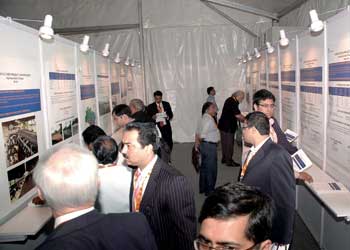 Methane
Marketplace Overflows with Projects
Methane
Marketplace Overflows with Projects
More than 150 project opportunities and success stories from Partner Countries were showcased in two exhibition halls, dubbed the "Methane Marketplace" during the Partnership Expo. These project posters and flyers gave participants the chance to learn firsthand about project details and network with project representatives. The projects exhibited at the Partnership Expo have the potential to reduce greenhouse gas emissions by 17 million metric tons of carbon dioxide equivalent annually. Rotating success stories featured at the Partnership Expo will soon be posted on the Methane to Markets Web site.
Sector Updates
Each subcommittee met during the Expo to discuss recent news and developments as well as determine future directions and actions.
Agriculture
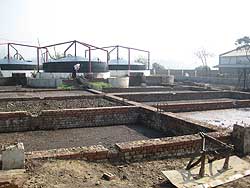 The
agriculture sector activities included a site
visit, technical and policy sessions, and a subcommittee meeting. For the site visit,
participants visited the Shri Krishna Gaushala in the Karera Village in Ghaziabad,
India. A gaushala is a sanctuary for old, sick, and abandoned cows. At the Shri
Krishna Gaushala, there are 1,000 cows whose manure is processed in three onsite
anaerobic digesters. Some of the biogas produced by the digesters provides electricity
for the site; the rest is purified and bottled onsite for use offsite. The
Indian Institute of Technology (IIT)
The
agriculture sector activities included a site
visit, technical and policy sessions, and a subcommittee meeting. For the site visit,
participants visited the Shri Krishna Gaushala in the Karera Village in Ghaziabad,
India. A gaushala is a sanctuary for old, sick, and abandoned cows. At the Shri
Krishna Gaushala, there are 1,000 cows whose manure is processed in three onsite
anaerobic digesters. Some of the biogas produced by the digesters provides electricity
for the site; the rest is purified and bottled onsite for use offsite. The
Indian Institute of Technology (IIT)
 developed and maintains the biogas purification and bottling system. Dr. Virendra
Vijay from IIT hosted the site visit and provided an onsite presentation about the
process.
developed and maintains the biogas purification and bottling system. Dr. Virendra
Vijay from IIT hosted the site visit and provided an onsite presentation about the
process.
Technical sessions included addressing financial and political barriers to implementing anaerobic digestion (AD), opportunities to use AD across the food and agriculture sector, and other agricultural sources of methane, such as enteric fermentation and rice cultivation.
The Agriculture Subcommittee met to determine
its future work based on the input of the participants. Additionally, the subcommittee
welcomed Anil Dhussa from the Indian Ministry of New and
Renewable Energy
 as a third Co-Chair. Participants also heard country updates, discussed international
guidance to characterize the environmental performance of AD systems, and considered
including sources of agricultural methane beyond manure into the work of the Partnership,
including enteric fermentation and rice cultivation.
as a third Co-Chair. Participants also heard country updates, discussed international
guidance to characterize the environmental performance of AD systems, and considered
including sources of agricultural methane beyond manure into the work of the Partnership,
including enteric fermentation and rice cultivation.
Coal Mines
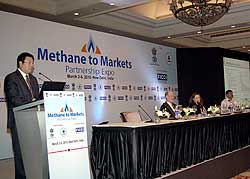 The
coal mines sector included a subcommittee meeting
as well as breakout sessions that covered the current status and trends in coal
mine methane (CMM) project development. The breakout sessions also covered technology
development for both methane-rich gas and ventilation air methane (VAM), drainage
and utilization best practices, and policies and regulation affecting CMM project
development. Perspectives on policy, regulation, and overall development trends
were provided for several countries, including
Australia, China,
India, Mexico,
Poland, Ukraine, and the
United States. Discussion also touched on carbon
finance, specifically for CMM abatement.
The
coal mines sector included a subcommittee meeting
as well as breakout sessions that covered the current status and trends in coal
mine methane (CMM) project development. The breakout sessions also covered technology
development for both methane-rich gas and ventilation air methane (VAM), drainage
and utilization best practices, and policies and regulation affecting CMM project
development. Perspectives on policy, regulation, and overall development trends
were provided for several countries, including
Australia, China,
India, Mexico,
Poland, Ukraine, and the
United States. Discussion also touched on carbon
finance, specifically for CMM abatement.
Examples of technologies discussed included a fuel cell power plant in South Africa
operating on coalbed methane (CBM), the potential for converting CBM or CMM to compressed
natural gas to power the dual fuel engines of Indian railways, and various technologies
for VAM utilization. Also notable was the recent release of the
United Nations Economic Commission for Europe
 Best Practice Guidance for Effective Methane Drainage and Use in Coal Mines,
announced during the session on CMM best practices.
Best Practice Guidance for Effective Methane Drainage and Use in Coal Mines,
announced during the session on CMM best practices.
The Coal Subcommittee focused on the Steering Committee's charges discussed topics such as potential impacts for the coal sector of expanding Partnership to include methane abatement and flaring. There was also a leadership review that resulted in the promotion of Vice-Chair Dr.Huang Shengchu to Subcommittee Co-Chair. Additionally, representatives from Partner Country governments as well as the Project Network shared updates relating to CMM activities.
Landfills
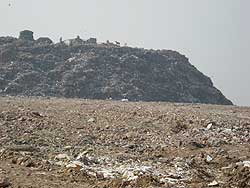 In
the landfill sector, breakout sessions covered
lessons learned in assessing landfill gas (LFG) project potential, methods for improving
LFG recovery and site safety, and how to develop LFG projects. Especially exciting
were presentations by representatives of Argentina
and Ukraine discussing the success of their
Methane to Market-supported LFG projects. In the three years since the last Expo,
the Partnership has moved from discussing and planning projects to implementing
demonstration projects!
In
the landfill sector, breakout sessions covered
lessons learned in assessing landfill gas (LFG) project potential, methods for improving
LFG recovery and site safety, and how to develop LFG projects. Especially exciting
were presentations by representatives of Argentina
and Ukraine discussing the success of their
Methane to Market-supported LFG projects. In the three years since the last Expo,
the Partnership has moved from discussing and planning projects to implementing
demonstration projects!
Approximately 30 Expo attendees had the opportunity to visit the Okhla Landfill in New Delhi. The landfill is one of New Delhi's three operational dump sites and has been the site of pump tests conducted by the U.S. EPA. According to preliminary estimates, the landfill can produce nearly 2.7 megawatts of electricity.
During the Expo, the Landfill Subcommittee discussed activities for 2010, such as the development of a landfill biogas project best practices guide. Based on charges from the Steering Committee, they discussed where the new focal area of wastewater treatment should be incorporated into the Partnership Structure and if it is appropriate to expand the mission of the Partnership to include methane abatement (e.g., flaring of biogas).
Oil and Gas Systems
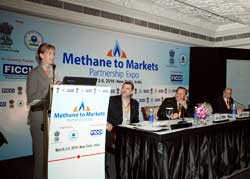 The
oil and gas systems sector included a Subcommittee
meeting and technical and policy breakout sessions. These sessions addressed a variety
of topics including proven technologies and practices that support verifiable emissions
reductions, countries and companies addressing climate change through project development
(including examples of projects that are part of the UNFCCC's
Clean Development Mechanism
The
oil and gas systems sector included a Subcommittee
meeting and technical and policy breakout sessions. These sessions addressed a variety
of topics including proven technologies and practices that support verifiable emissions
reductions, countries and companies addressing climate change through project development
(including examples of projects that are part of the UNFCCC's
Clean Development Mechanism
 ),
and successful examples of international technology transfer. The presenters also
expressed the need for new, standardized methodologies and training on how to apply
them.
),
and successful examples of international technology transfer. The presenters also
expressed the need for new, standardized methodologies and training on how to apply
them.
At the subcommittee meeting, participants discussed how to respond to the Steering Committee charge, engage more members in Partnership activities, identify country-specific content for the Web site, and identify and collaborate with programs that share Partnership goals.
Recent Developments
- U.S. EPA Extends Grant Deadline. U.S. EPA has recently
extended the deadline for applying for
funding for Methane to Markets projects
 .
The new deadline is 29 July 2010. Up to 35 projects are anticipated
to receive grants ranging from $100,000 to $750,000, with an estimated total award
of $5 million. Successful proposals will support the Partnership's goals of reducing
methane emissions and advancing project development in Methane to Markets developing
countries, countries with economies in transition, or in countries that are applying
to join the Partnership.
.
The new deadline is 29 July 2010. Up to 35 projects are anticipated
to receive grants ranging from $100,000 to $750,000, with an estimated total award
of $5 million. Successful proposals will support the Partnership's goals of reducing
methane emissions and advancing project development in Methane to Markets developing
countries, countries with economies in transition, or in countries that are applying
to join the Partnership.
- U.S. EPA Develops New LFG Models to Support the Methane to Markets Partnership.
The Philippines
(XLS, 3.4 MB)
 and
Thailand LFG models (XLS, 3.4 MB)
and
Thailand LFG models (XLS, 3.4 MB)
 provide general estimates of LFG generation and recovery potential in each country.
The models provide recommended values for input variables based on climate data,
waste characteristics, and disposal practices and the estimated effect of these
conditions on the amounts and rates of LFG generation. Each model comes with
a user's manual.
provide general estimates of LFG generation and recovery potential in each country.
The models provide recommended values for input variables based on climate data,
waste characteristics, and disposal practices and the estimated effect of these
conditions on the amounts and rates of LFG generation. Each model comes with
a user's manual.
What's Next?
- What did you think of the Partnership Expo? Please tell us!
Complete this survey.
 .
. - You aren't a Project Network member yet? Join Us and get involved in the premier international methane partnership.
- Please send us news about your methane project successes or any ideas for newsletter articles. Also, if you know of colleagues interested in methane use and mitigation, forward this newsletter!
